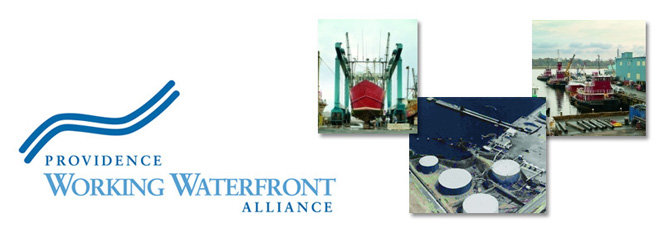In a recent Providence Business News interview piece, Patrick Conley’s business partner, Erik Bright, makes a number of misleading comments regarding the Allens Avenue Corridor and area businesses.
Bright comments:
. . . it is important to recognize that the restrictive W-3 zoning that was implemented by the city in 1994 has everything to do with the fact that no new businesses have located on this section of the waterfront . . . We can only ask the question that if there were a need for other maritime businesses that wanted to be on the waterfront, why haven’t they relocated there in the past 15 years?
Working Waterfront response:
It is inaccurate that no businesses have located on the Allens Ave. working waterfront since the city created the restrictive W-3 zoning in 1994.
University Shuttle, which runs Brown’s student shuttle service, has been operating at 284 Allens Ave for five years, and employs approximately 40 people.
J. Goodison Company, a full-service marine and industrial repair contractor, has partnered with Promet Marine for the past three years, and primarily operates from Promet’s Allens Ave facility. As a federal HUBZone contractor, J. Goodison has helped attract numerous Coast Guard and Navy repair contracts, and has hired and trained many employees from economically depressed areas of Providence.
Indeed, area businesses including Promet Marine Services (marine repair), Sprague Energy (oil storage and materials handling), Providence Steamboat (tugboat services), Narragansett Improvement (asphalt plant), Walco Electric (automation engineering and industrial service), Philip Services Corp. (environmental services), and J. Goodison Company are thriving precisely because of the existing industrial zoning. According to an economic impact report, these 7 water-dependent, water-enhanced, and industrial businesses are responsible for:
- $294,000,000 in annual business sales
- 372 workers (90% full time) with an average total compensation of approximately $60,000 per year
- Direct, indirect, and induced effects combined = $324 million in total business output within the state, over 700 jobs, and nearly $30 million in household income
The uncertainty that has been cast over the Allens Ave Corridor by the city’s mixed-use vision has actually scared away businesses. At a September 2008 public hearing, real estate broker Frank Jacques testified that he was in advanced negotiations with two businesses who were scared away due to the uncertainty over future zoning. From the Providence Journal’s coverage of the meeting:
However it turns out, this debate has already cost the city business, said commercial real estate agent Frank Jacques, who has been trying to market the 12-acre lot at 434 Allens Ave.
He said that in the last year, he had two businesses lined up — “written offers, with deposits” — looking to use the property, before they both pulled out.
The zoning debate is what made them run, he said.
“The comments we received, unsolicited, is that they didn’t want to get embroiled in the debate we’re having right now — rezoning.”
Bright comments:
And there would be a hotel that would provide a shuttle to the hospital and short-term housing solution for friends, family and guests of patients in the hospital. All of these are commercial uses that do not interfere with the current uses on the waterfront.
Working Waterfront response:
A hotel located directly between a major oil terminal and a marine repair shipyard would almost certainly interfere with the existing businesses. Hotel guests expecting a quiet stay are sure to complain about the busy truck traffic, loud noises, and bright lights that are typical of normal operations at both Sprague and Promet. These complaints will inevitably lead to political pressure to pass operating restrictions that would threaten the future of these businesses.
Bright comments:
Those who oppose rezoning say they fear a loss of jobs within the existing uses, but their businesses would be grandfathered. We would suspect that what they really fear is that the redevelopment would force the existing businesses to comply with environmental regulations resulting in considerable remediation costs.
No environmental remediation is needed for existing industrial uses on Allens Ave. Expensive environmental remediation would only be required for those parcels, like Providence Piers, that propose to be used for residential or hotel uses (should zoning be changed to allow for such uses).

